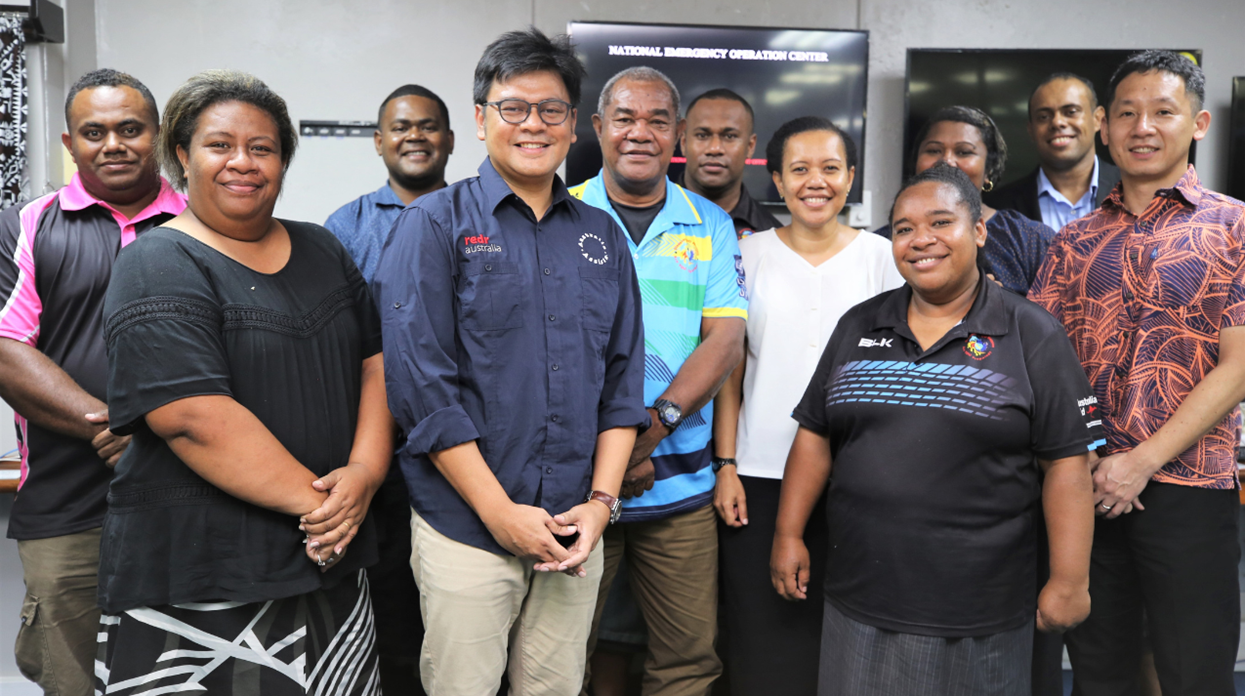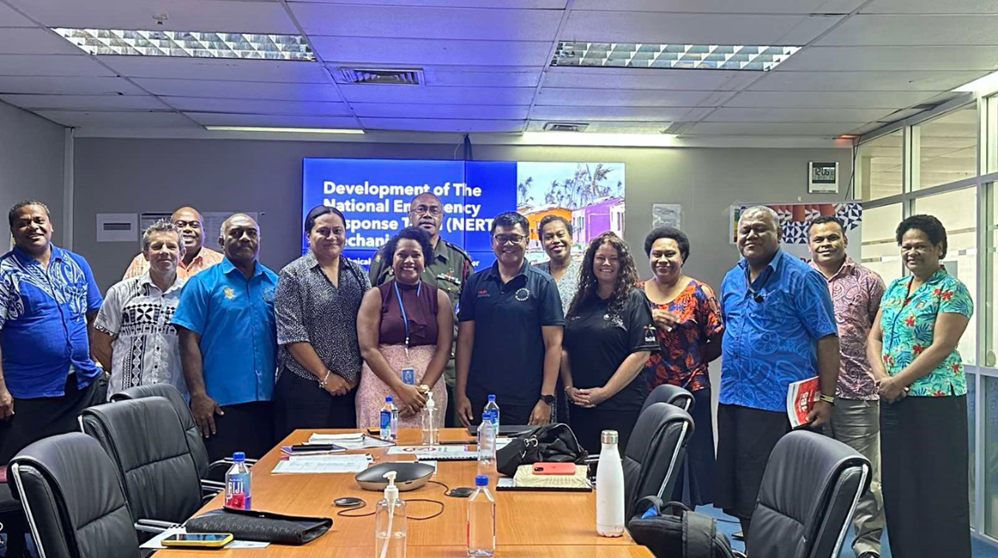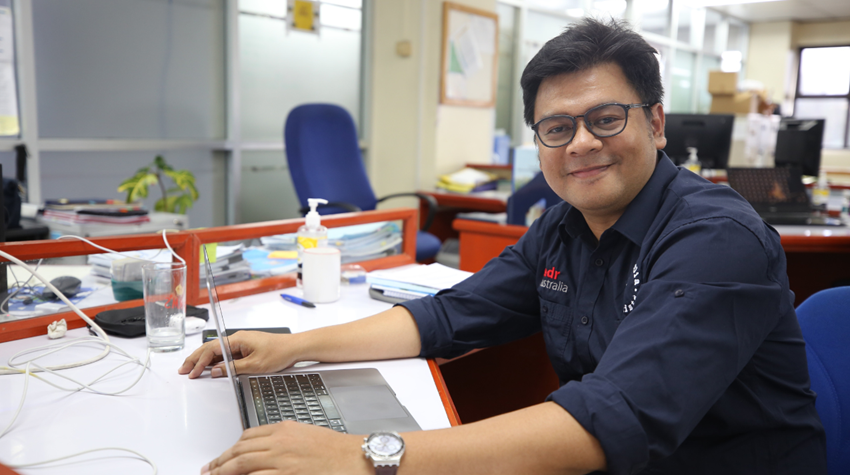Australia Assists deployee Yos, is a Disaster Management Specialist working with the Fiji Government to strengthen their disaster preparedness and response capability at home and further afield.
Yos is the first Australia Assists deployee to be placed with the Government of Fiji. He is also part of the 10% of deployees to work in National Disaster Management Offices (NDMO) across the Pacific.
Currently ranked 15th among countries with high disaster risk, Fiji is highly vulnerable to natural hazards like tropical storms, earthquakes, cyclones, flooding, tsunamis, landslides, and wildfires. In addition, Fiji is one of the most vulnerable nations to climate change, affirming that Yos’ role is much needed and timely.
The Fiji Government have recognised the need to develop a National Emergency Response Team (NERT) mechanism which will be triggered when a disaster surfaces and facilitates the rapid deployment of emergency response teams both in-country and outside Fiji.
“My deployment provides technical assistance for the government of Fiji to develop an operation for reducing the risk of disaster and preparing to respond to disasters effectively inside the country and in other Pacific Island countries,” Yos explains.
Yos’ work on the NERT is helping to establish standard operating procedures that will help mobilise agencies and enhance their ability to respond in an emergency. In a disaster vulnerable nation like Fiji, having such procedures can saves lives.
Training is key for effective emergency response
Early in his deployment Yos conducted a training needs assessment before organising consultation workshops followed by pilot training. He has also facilitated the development of the training curriculum.
As a Humanitarian Training Coordinator with NDMO Fiji, Yos is working in partnership with the Ministry of Rural Maritime and Disaster Management preparing Guidelines and Training for the NERT operation.
“This includes benchmarking with other surge mechanisms at the regional and global levels, conducting training needs assessment and consulting with different agencies such as relevant ministries and UN agencies through-technical working group meetings,” explains Yos.

Yos with colleagues from the Fiji National Disaster Management Office. Photo: Australian High Commission Fiji.
Preparedness is key in the wake of a disaster
Australia Assists deployments like Yos’ provide necessary technical expertise on the ground. His deployment is helping to strengthen the Fiji Government’s capacity to prepare for and respond to natural hazards and emergencies and eventually for the broader region.
Supporting Pacific neighbours in the whole disaster cycle is a key priority for the Australian Government through the Australia Assists Program. Australia's humanitarian action is designed to save lives, alleviate suffering, and to strengthen preparedness for future emergencies.
The NERT will embody these aims by helping ensure early responders regionally, nationally, and internationally can coordinate and work more effectively in an emergency response. It includes both government and humanitarian agencies.
This is Yos’ first Australia Assists deployment having been identified as a strong candidate through the RedR Australia roster, and Yos is enjoying the new role.
“A good working relationship with the NDMO has been developed. The host organisation embraces me and is supportive of my role,” says Yos.
“In addition to the technical assistance provided through my deployment, the government of Fiji has also designed the governance around the mechanism to ensure that it can be operationalised. A cabinet paper on NERT mechanism has recently been approved,” reports Yos.
The NDMO has formed a Technical Working Group (TWG) on NERT to ensure a collaborative and informed approach in developing the mechanism, involving relevant ministries, regional organisations (Secretariat of the Pacific Community) and UN stakeholder organisations such as OCHA, WFP and WHO.
“The next milestone for me is to support the NDMO to conduct the first NERT Induction Training, scheduled in July, to test the Guidelines and Training Manual,” says Yos.

Australia Assists deployee Yos (pictured centre) is supporting Fiji National Disaster Management Office (NDMO) as a Humanitarian Training Coordinator.
Australia Assists supporting the Pacific Region
Yos is one of 49 technical experts deployed by Australia Assists to eight countries across the Pacific Region throughout 2022. He is also part of the 36% of Australia Assists deployments globally contributing to disaster risk reduction.
At the end of his deployment, Yos will have contributed to the improvement of disaster preparedness in Fiji.
“My Australia Assists deployment provides opportunities to support the government and, at the same time, allows the government to lead the initiatives,” says Yos.
“The deployment also provides sufficient time to contextualise the technical knowledge that I offer into Fiji context.”
As an Indonesian national, Yos understands that local knowledge is critical for the success of the NERT once it’s ready for roll-out.
Australia Assists provides impactful assistance to host communities and provides fulfilling professional opportunities for experts like Yos.
“I am grateful for this opportunity and feel lucky to be a part of the Australia Assists program. It allows a two-way knowledge exchange on best practices and lessons learnt around the work. The Australia Assists program is important because it provides unique and tailored support for the government to address challenges in reducing the risk of disaster and enhancing resilience,” says Yos.
Australia continues to support disaster risk reduction in Fiji and the broader Pacific region through a range of measures. Australia Assists has earned a strong reputation for providing timely and effective support on the ground where it’s needed most.
Learn more about Australia Assists and the work of deployees before, during and after emergencies.


